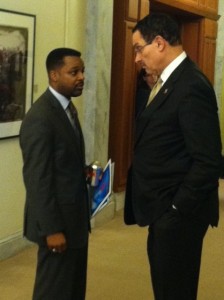When it comes to pursuing potential corruption, D.C. has a double standard. Elected officials advocating for the city’s African Americans are scrutinized to within an inch of their lives, while those looking out for the downtown business community largely get a pass.
Two black legislators, former Councilmember Harry Thomas and former Council Chairman Kwame Brown, have recently pleaded guilty to felonies. But any investigation into potential D.C. government corruption should begin with Councilmember Jack Evans.
As chairman of the powerful Finance and Revenue Committee, Evans helped shepherd through a deal which provides $272 million in public subsidies to assist Marriott in building an 1,167 room hotel alongside the convention center. At the eleventh hour, Evans recused himself from voting on the matter after being questioned about a potential conflict of interest. Later, he reinserted himself in the deal when it became ensnarled in legal complications.
When asked why he recused himself, Evans said it was out an “abundance of caution.” However, in a 2009 email Evans said, “I recused myself from the recent consideration of the financing legislation for the convention center hotel as my law firm, Patton Boggs, represents ING who are the equity partners in the private financing part of the hotel.” Indeed, at the time of the deal, ING, the real estate investment firm, was represented by Patton Boggs, the powerhouse lobby firm which pays Evans $190,000 a year (on top of his $125,000 council salary).
Councilmembers are required by law to file an explanation for their recusals, but in a series of articles, former Washington Post reporter John Hanrahan noted that Evans hadn’t filed anything. TheFightBack‘s inquiries into whether Evans has subsequently filed an explanation went unanswered. This would seem to be right up the alley of U.S. Attorney Ron Machen, who’s pledged to continue a “vigorous prosecution of elected leaders who violate the public trust and break the law.”
But Machen seems more interested in going after the Post‘s targets, like Brown, even when there’s no misuse of public office. David Simon, the creator of The Wire and former Baltimore Sun reporter, called Brown’s prosecution “an embarrassment for the U.S. Attorney’s Office.” Simon told the Kojo Nnamdi Show on WAMU, “As a longtime police reporter, whenever I see the bank fraud charge leading the way for a federal investigation, what I know almost to a certainty is that… [the prosecutors] came up empty everywhere else.”
With Thomas and Brown down, Mayor Vincent Gray appears to be next on Machen’s list. Gray entered politics late in life, having spent his career in the public and nonprofit sector, where he worked with homeless youth and adults with disabilities. Gray is a serious public servant who’s known for his work ethic, and under his chairmanship the Council consistently earned high approval ratings.
But ever since Gray’s upset victory in the 2010 Democratic mayoral primary over the business community’s favorite son, Adrian Fenty, he’s been a marked man; particularly by the Washington Post, which backed Mayor Fenty to the hilt and hasn’t gotten over the loss.
While District voters continue to stubbornly refuse to ratify the Post‘s anointed leaders, Machen has shown that he’s willing to play ball and he’s been picking off the paper’s nemeses one at a time. This has emboldened the Post and other news outlets, which have recently taken their campaign against Gray to new and impressive heights.
The focal point of the attack has been Gray’s 2010 campaign, and more specifically Sulaimon Brown, a minor candidate in the mayoral contest who Gray’s campaign paid to stay in the race to continue attacking Fenty. Brown was paid via money orders and cash, which amounts to a violation of campaign law, not the end of the world as reporters are making it seem.
“There was no way to know it at the time, but we were eyewitnesses to a fraud, bought and paid for by [Gray’s] 2010 mayoral campaign,” wrote Post columnist Colbert King. “Gray is either a fool or a liar – and I’m inclined toward the latter,” wrote Post columnist Robert McCartney, whose follow up column is entitled, “Explain or resign, Mayor Gray.” Not to be outdone, City Paper‘s Loose Lips said the mayor is “either a crook or an incompetent leader, and it’s hard to tell which is worse.”
A focal point of the Post‘s effort is to tie Gray in with other Council misdeeds. “How far does the rot go?” asked a Post editorial in the wake of Chairman Brown’s resignation. In a front page story in last Sunday’s Post entitled “D.C. grapples with ‘culture of corruption,'” the Post wrote that a trio, consisting of Gray, Brown and Thomas, has “plunged the District into a new round of crisis, triggering reminders of the worst aspects of the Barry era and fears that the city’s political culture is regressing.” “What we have here is a centipede of corruption. There are more shoes to drop,” NBC 4 reporter Tom Sherwood wrote in an op-Ed in Sunday’s Post. “Let’s be clear, we’re talking about the possibility of Gray being charged and forced from office,” said the former Post reporter, who’s been a leading critic of Brown and Gray.
In D.C., particularly among African Americans, there’s growing anger over the double standard regarding who gets targeted for media scrutiny, and who gets targeted for prosecution. Remarkably, the Post has characterized the many who are upset by this as insignificant. “As far as I can tell, nobody of significance is complaining publicly today that the U.S. Attorney’s Office has treated Brown and Thomas unfairly,” wrote McCartney. Yet even he noted that the focus has been on “the predominantly African American eastern wards where Machen’s legal bulldozer threatens to raze the existing power structure.”
Both the media and Machen’s legal bulldozer should have one standard for dealing with potential corruption, and that standard should be applied equally to all public officials.
Related Stories:
Why Won’t the Post Say Jack About Evans? Nov. 3, 2011

